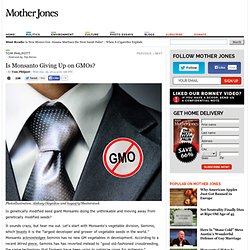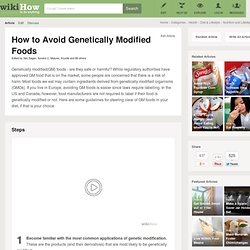

GMO (Genertically Modified Organisims) GMO pearls. Other GMO Research. This Game-Changing Lawsuit Could Help Farmers Fight Monsanto. Farmers Abandoning GMO Seeds And The Reason Will Surprise You. Aaron Bloom.

Image source: Modern Farmer A growing number of farmers are abandoning genetically modified seeds, but it’s not because they are ideologically opposed to the industry. Simply put, they say non-GMO crops are more productive and profitable. Modern Farmer magazine discovered that there is a movement among farmers abandoning genetically modified organisms (GMO) because of simple economics. “We get the same or better yields, and we save money up front,” crop consultant and farmer Aaron Bloom said of non-GMO seeds. The re-converts to non-GMO seeds are not hippies but conservative Midwestern farmers who are making a business decision, Modern Farmer discovered.
“Five years ago the [GMO seeds] worked,” said farmer Christ Huegerich, who along with his father planted GMO seeds. Farmers can get paid more for conventional corn than GMO corn. New Survival Seed Bank™ Lets You Plant A Full Acre Crisis Garden! "We The People, Genetically Modified?" Is Monsanto Giving Up On GMOs? Is genetically modified seed giant Monsanto doing the unthinkable and moving away from genetically modified seeds?

It sounds crazy, but hear me out. Let’s start with Monsanto's vegetable division, Seminis, which boasts it is the "largest developer and grower of vegetable seeds in the world. " Monsanto acknowledges Seminis has no new GM vegetables in development. According to a recent Wired piece, Seminis has has reverted instead to "good old-fashioned crossbreeding, the same technology that farmers have been using to optimize crops for millennia. " Why? But the Wired piece also suggests a factor that doesn't get nearly enough attention: GM technology doesn't seem to be very good at generating complex traits like better flavor or more nutrients, the very attributes Monsanto was hoping to engineer into veggies. Furthermore, genetically modifying consumer crops proved to be inefficient and expensive. Okay, that's vegetables. GMO's. GMO's III. GMOs & Pest Control. Do GMO Crops Really Have Higher Yields? According to the biotech industry, genetically modified (GM) crops are a boon to humanity because they allow farmers to "generate higher crop yields with fewer inputs," as the trade group Biotechnology Industry Organization (BIO) puts it on its web page.

Buoyed by such rhetoric, genetically modified seed giant Monsanto and its peers have managed to flood the corn, soybean, and cotton seed markets with two major traits: herbicide resistance and pesticide expression—giving plants the ability to, respectively, withstand regular lashings of particular herbicides and kill bugs with the toxic trait of Bacillus thuringiensis, or Bt. Turns out, though, that both assertions in BIO's statement are highly questionable. Washington State University researcher Charles Benbrook has demonstrated that the net effect of GMOs in the United States has been an increase in use of toxic chemical inputs.
That may be true, but it's a long way from "generating higher crop yields with fewer inputs. " How to Avoid Genetically Modified Foods: 8 steps. Edit Article Edited by Serj Sagan, Sondra C, Maluniu, Krystle and 66 others Genetically modified(GM) foods - are they safe or harmful?

While regulatory authorities have approved GM food that is on the market, some people are concerned that there is a risk of harm. Most foods we eat may contain ingredients derived from genetically modified organisms (GMOs). If you live in Europe, avoiding GM foods is easier since laws require labelling. Ad Steps Genetically Modified Foods Step 1.360p.mp4 00:00 00:03 00:03 spaceplay / pauseescstopffullscreenshift + ←→slower / faster (latest Chrome and Safari)←→seek . seek to previous 12…6 seek to 10%, 20%, …60% 1Become familiar with the most common applications of genetic modification. Genetic-weapon-against-insects-raises-hope-and-fear-in-farming.
Scientists and biotechnology companies are developing what could become the next powerful weapon in the war on pests — one that harnesses a Nobel Prize-winning discovery to kill insects and pathogens by disabling their genes.

By zeroing in on a genetic sequence unique to one species, the technique has the potential to kill a pest without harming beneficial insects. That would be a big advance over chemical pesticides. To see the full article, subscribe here. The scientists who first unraveled this mechanism won the 2006 Nobel Prize in Physiology or Medicine, and it was initially assumed that most of the use would be in medicine. Imagine drugs that could turn off essential genes in pathogens or tumors, or one that contributes to high cholesterol. The initial euphoria has cooled somewhat, in part because it has been difficult to deliver the RNA through the bloodstream into the cells in the body where it is needed. Using RNAi in insects, at least for beetles, should be easier than in people. Anti-GMO & Pecticide activists & Scientists.